Movie Review: Star Trek (2009)
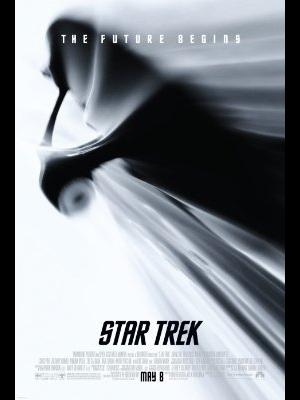 | | Star Trek (2009) |
There have been many reboots in recent memory, starting with The Sum of All Fears and going on to include such wonderful surprises as Batman Begins and Casino Royale. The latest--and most inventive--reboot is J.J. Abrams' Star Trek, a movie that is sure to please a wide popcorn-hungry audience. Star Trek takes a worn-out franchise and breathes new life into it. There's both more grit and more polish; the special effects are breath-taking; and the scale of production is mind-bogglingly huge. It is sure to make the Trek brand a little cooler, and many trekkies are sure to be satisfied. But is it really a good movie? Does it really live up to the hype?
Yes and no. While this is no doubt an awesome action movie that will keep most people entertained, it has some pretty serious flaws that are hard to overlook. Let's get those out of the way first.
The camera work, while not as migraine-inducing as The Bourne Supremacy or Quantum of Solace, is a bit too tight and claustrophobic. There aren't many establishing shots, and the audience is never given a clear idea of how major sections of the Enterprise are laid out. There are far too many close-ups, most of which are done with hand-held cameras, and there are obscenely frequent lens flares in the foreground that obscure the action. Epileptics probably shouldn't go to the theater for this one.
The music is also a little disappointing. Michael Giacchino's score tries too hard to be epic and triumphant, but his melodies seem random and obtuse. It also tends to get overbearing or jarring during the most emotional moments, when it would be best to tone it down. It isn't until the closing credits that we are finally given the iconic Star Trek theme, and it is far superior to any of Giacchino's meanderings.
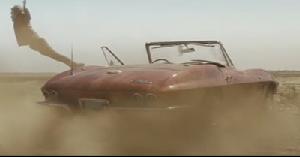 | | This is the worst scene in the movie |
Speaking of music, what the hell are the Beastie Boys doing in Star Trek? There is a scene very early in the movie (it's in all the previews) where a very young Kirk is racing his step-father's sports car (J.J. Abrams devotees might notice that Kirk's step-father is voiced by Greg Grunberg). This scene, beyond being completely pointless, is highlighted by an extremely loud Beastie Boys track and an unwelcome Nokia product placement. This scene, all by itself, costs the movie half a star from my final score. It's that terrible. It took me another ten minutes to get back into the film.
The biggest issue with the movie, though, is the storytelling. Events happen far too conveniently. For example, the entire medical crew save a young Dr. McCoy just happens to die so that McCoy can be the ship's head doctor; the time travel mechanic on which the plot centers is never explained (a black hole, rather than spaghettifying two spaceships and crushing them into nothingness, transports them safely in the past?); Uhura just happens to be the only person on the ship who can translate Romulan so that she can become the ship's communications officer (even after the crisis passes, the older and more experienced communications officer doesn't reappear); Kirk just happens to be exiled on the same planet as the older Spock and a young Montgomery Scott (both of whom are within walking distance of Kirk's landing site, of course, making one wonder if this planet is any bigger than a mile or two in diameter); the villain does absolutely nothing for twenty-five years so that he can be responsible for Kirk's father's death and can be the main villain of the movie; and in the end (this isn't a major spoiler, really), this crew of cadets who just happened by the most proposterous providence to get positions of authority on the Enterprise's maiden voyage are actually given command of the flagship of the Federation. Leaving the theater, the writer in me was screaming that the plot was beyond all reason.
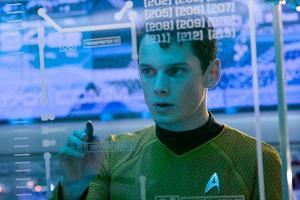 | | Anton Yelchin's Chekov is probably my favorite rebooted character |
Additionally, the story lacks any major thematic punch or modern political relevance, two things Star Trek has always been known for. It is, for better or for worse, devoted to setting a new stage and throwing as much action on the screen as possible, not to offering an allegory about the modern world or delving deep into the human condition.
However, the writers should not be tied to posts and shot just yet. The task given them is an unenviable one; they had to juggle an enormous universe of content while making a respectable action flick that would be easy to follow and entertaining to watch. There is some mastery in the writers' ability to capture the characters and give them superb dialogue. They took great care in minimizing the technobabble that has alienated audiences in the past, and they managed to put a lot of heart into a simple narrative. Despite an overreliance on ludicrous coincidences, the story, on the whole, makes sense and honors the spirit of the franchise. The critical relationships between the characters is developed quickly and admirably, though there is one new relationship that is unusual.
It was the characters I was most worried about before I saw the movie. Luckily, this is where the movie shines, and it is in no small part due to the casting. Chris Pine's Kirk is a new interpretation of the character without losing the bravado and alpha male spark of Shatner's; Karl Urban's Mccoy is scary similar to DeForest Kelly and captures the enormously important chemistry between Bones, Kirk, and Spock; Zachary Quinto's young Spock is an interesting interpretation of a more troubled half-vulcan whose emotions brim a lot closer to the surface thanks to youth and stress, but Quinto never quite escapes his Sylar persona; Simon Pegg's Scotty is absolutely brilliant; John Cho's Sulu is slightly more bad-ass; Zoë Saldaña's Uhura is a much more important character with a lot of youthful sexuality, though she bears little resemblance to Nichelle Nichols' original character; and Anton Yelchin's Chekov has an even thicker accent and a great energy. The only real weak spot is the villain, Nero (played by Eric Bana), who is given bland motivation and little room to play, though he does have one or two good moments.
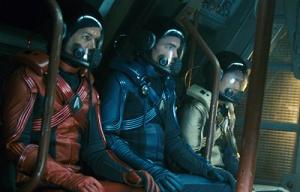 | | Sulu, in grey, Kirk, in blue, and Olsen, in red: what do you think is going to happen on this away mission? |
There are also a few neat touches that are directed at the trekkies in the audience. Little things like Sulu's "combat" skills and what happens to the only man to don a red outfit on an away mission are beautiful nods that aren't misplaced and don't confuse the more casual audience.
By far the best thing about Star Trek, though, is the rebooted atmosphere. Things seem bigger and more chaotic, which adds a quirky sense of realism that has never been a part of the franchise. The space battles occur at a more furious and intense pace, where calculated chess moves are replaced by lightning quick reflexes and sudden death. Space is treated a little more realistically than ever before, though the battles are still punctuated by loud, fiery explosions and there is no time confusion when it comes to warp speed. All in all, though, being in the depths of space feels more dangerous and exciting than it ever did in the previous incarnations.
In addition to the treatment of space, there are the aliens, who--while still largely humanoid--definitely look more alien. There is also the number of people thrown into almost every shot, the more industrial look of the Enterprise, and the cooler look of transporters and warp speed. All of this comes together to set a new standard, one that should certainly be respected from this point forward.
Because, at its heart, this movie is all about setting a new paradigm. It has its weaknesses, but the stage Star Trek has laid out is amazing and promises wonderful adventures to come. The style of the reboot is also unique, in that it doesn't out and out reject everything that has come before, the way the Batman, James Bond, and Jack Ryan reboots do. In true Trek fashion, this reboot is accomplished using time travel and alternate reality, and it's clever enough to bring a smile to this trekkie's lips. They have cleaned the slate so that whatever follows can discover things as brand new and not be tied down to the tedious conundrum of continuity that has plagued the franchise for the last few years. This is important, for the movie clearly seeks to draw in a new audience, one that might not be very familiar with the intricacies of Cardassian first contact or the fine print of the Khitomer Accords.
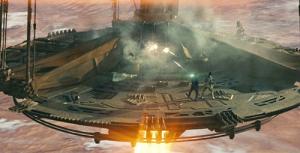 | | The action scenes are very, very cool |
Still, the hardcore trekkie might feel a little left out, because this new continuity essentially erases the previous treks (apart from Enterprise, which takes place before the reboot). It might be a little awkward watching the original Star Trek television series, knowing that it is doomed to be rewritten by an angry Romulan who accidentally travels back in time.
Maybe we trekkies should let that go, though, because this new version has a whole lot of promise. I, for one, can't wait to see where it goes next.
FINAL SCORE:





While the story is sorely lacking, the acting, action, special effects, and sheer awesomeness of this blockbuster reboot are hard to dislike.
|
-e. magill 05/11/2009
|
|